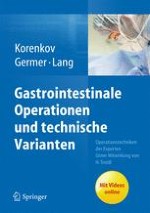2013 | OriginalPaper | Buchkapitel
10. Individualisierte Chirurgie bei Rektumkarzinomen
verfasst von : Michael Korenkov, Prof. Dr. med., Christoph-Thomas Germer, Prof. Dr. med., Hauke Lang, Prof. Dr. med., Matthias Anthuber, Prof. Dr. med., Alexis Ulrich, Prof. Dr. med., Markus W. Büchler, Prof. Dr. med., Alois Fürst, Prof. Dr. med., Arthur Heiligensetzer, Dr. med., Peter Sauer, Dr. med., Gudrun Liebig-Hörl, Dr. med., Werner Hohenberger, Prof. Dr. Dr. h. c., Pierluigi Angelini, Dr., Kim Erlend Mortensen, Rolv-Ole Lindsetmo, Prof., Jurriaan Tuynman, MD PhD, Neil Mortensen, Prof., Amjad Parvaiz, Prof., Manfred Odermatt, Hans-Rudolf Raab, Prof. Dr. med., Achim Troja, Dr., Dalibor Antolovic, PD Dr., Peter Sagar, Prof., Jürgen Weitz, Prof. Dr. med., Christoph Reißfelder, PD Dr. med., Steven Wexner, MD, PhD (Hon), Marc Osborne, MD, Werner Kneist, Prof. Dr. med., Arnulf H. Thiede, Prof. Prof. h. c. Dr. Dr. h. c., Hans-Joachim Zimmermann, Dr. jur., Stig Norderval
Erschienen in: Gastrointestinale Operationen und technische Varianten
Verlag: Springer Berlin Heidelberg











